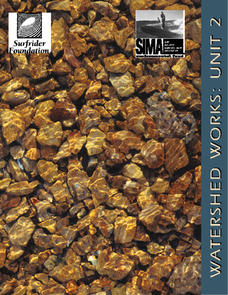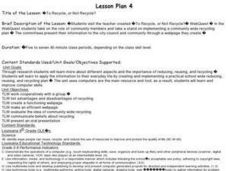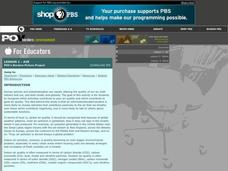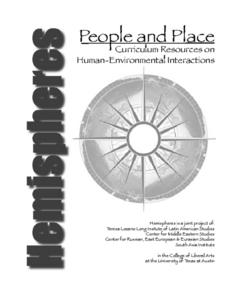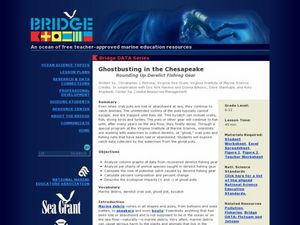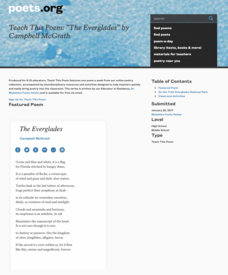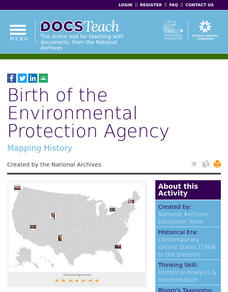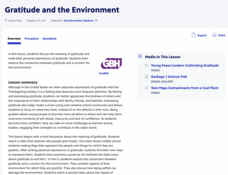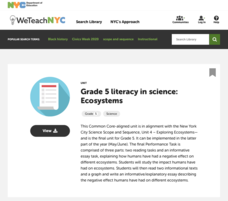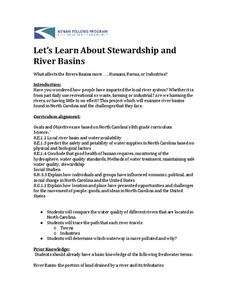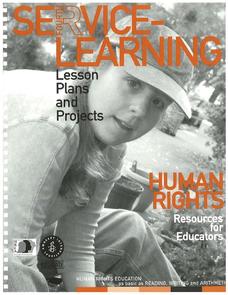Curated OER
Watershed Works: Unit 2
The second of a three-unit lesson plan, this focuses on how human-made structures affect watersheds. Using watershed models that were built during the first unit, junior geologists now place buildings, dams, or levees into the models and...
Curated OER
To Recycle, or Not Recycle?
To recycle or not to recycle, that is the question. Your class can find the answer by taking a teacher created WebQuest, where they assume a role of a community member taking a stand on implementing a community wide recycling plan. The...
Curated OER
Regents High School Examination: Living Environment 2010
This exam touches upon every topic within the typical first year biology course.. A broad variety of question styles give high schoolers every opportunity to show what they know. Why start from scratch when a comprehensive final exam is...
Curated OER
P.O.V.'s Borders Picture Project: Lesson 1 - Air
Take photos of human activities that impact air quality. Collaborative groups present one of the photographs, identifying how the activity contributes to air quality and what can be done to minimize the impact. As one in a series of...
Curated OER
"Croak" Science Mystery
Solve the mystery of a declining frog population! Lead your junior ecologists on an investigation that simulates actual events concerning pollution, predation, poaching, and more. Investigators read a story online, then analyze survey...
Curated OER
Big Dam Construction in India
This complete and full resource includes everything needed to conduct a instructional activity on the environmental impact of large dams in India. Background information, handouts, answer keys, and web links are all there to help you...
Curated OER
Ghostbusting in the Chesapeake
Ghost pots, fishing gear lost during crabbing expeditions, continue to trap crabs that are never collected. Increase your budding ecologists' awareness of human impact on the environment as well as conservation efforts using this...
Curated OER
Wind Power
What a wonderful way to explore wind power! Through this lesson, learners get a background in the history of wind power, create their own wind turbine, and the test their designs. This is a terrific way to tie scientific principles to...
Curated OER
Ecology Integration Using IMovie
Amazing! Any 5th grader would be more than willing to participate in this project. Students are broken into groups, each group reads one book from a list of five. They use their book as the basis for choosing an animal and environment to...
Curated OER
How Will We Create a Future without Waste?
Many young people act globally by reducing, reusing, and recycling, Now they take it to the next level by upcycling. Middle schoolers design a proposal to eliminate waste by exploring the new material cycle and applying their knowledge...
ReadWriteThink
Persuasive Essay: Environmental Issues
Young environmentalists learn how to craft a persuasive essay about an environmental issue they consider important. After studying the components of a persuasive essay and examining a student model, writers brainstorm possible topics and...
Beyond Benign
Decision Graphic Introduction
E is for economics, environment, and social equity. The fifth installment of a 15-part series has scholars first considering ecological impacts, such as determining how much water it takes to produce a can of soda. They then use decision...
DocsTeach
Environmental Case Study: Hetch Hetchy Valley
What is more important: building a new school or preserving a nature reserve? Keeping a natural area clean or providing clean drinking water to a city of millions? Young scholars weigh these questions—almost literally—using an...
Academy of American Poets
Teach This Poem: “The Everglades” by Campbell McGrath
Florida's Everglades come alive for young environmental scientists as they watch a video taken in the park and read a poem about the watery paradise. After a careful study of the two resources, class members consider the function of the...
Humane Education Advocates Reaching Teachers
Justice for All - Educating Youth for Social Responsibility: Grades 6-8
Teach middle schoolers how to develop healthy relationships with activities and lessons designed to create a kind and inclusive
classroom. Pupils create guidelines to develop a safe and civil learning environment. They learn how to...
DocsTeach
Birth of the Environmental Protection Agency
Seeing is believing when it comes to climate change. An informative activity explores the creation of the Environmental Protection Agency (EPA) and its efforts to document environmental issues with photographs. Academics match images...
PBS
Gratitude and the Environment
A class discussion begins a two-part lesson plan about gratitude and the environment. In part one, learners watch a video then share their feelings about its most memorable moment. Delving deep into the meaning of gratitude, scholars...
Just Health Action
Whose Backyard? Toxic Waste Management Meeting and Environmental Injustice
Toxic waste is a global problem. What to do with environmental hazards and where to put toxic waste is a global concern. To better understand current issues around toxic waste management and how current practices can lead to...
Just Health Action
What Makes a Community Healthy?
Young people have an opportunity to make it a beautiful day in their neighborhoods with an activity that asks them to identify what is healthy and unhealthy in their community and develop some ideas about what they can do to fix the...
New York City Department of Education
Grade 5 Literacy in Science: Ecosytems
How do humans affect ecosystems? Learners read two articles and interpret a graph to develop essays on the human impact on ecosystems. They read about human impact on tigers and manatees as a basis for their overarching papers.
Pace University
Grades 6-8 Ecology
Why are our national parks important? Scholars research the national parks and explore the basic ecology of these areas in a differentiated instruction unit on ecology. They learn about ecosystems, food chains, symbiosis, and biomes. The...
Population Connection
Lessons From the Lorax
Is progress progressing too fast? So believes the Lorax, the eponymous character from Dr. Seuss's The Lorax. Young environmental science students read the book and debate the arguments of the Lorax and the Once-ler regarding the value of...
Kenan Fellows
Let's Learn About Stewardship and River Basins
What does it mean to be a good steward? Middle school environmentalists learn to care for their state's waterways through research, a guest speaker, and poster activity. Groups must locate and learn more about a river basin and the human...
Amnesty International
Human Rights and Service Learning (Part 1)
What better way is there to teach about human rights than by seeing them firsthand? Introduce your class or club to the spirit of service through a myriad of service project ideas. First in a series of human rights instructional...


